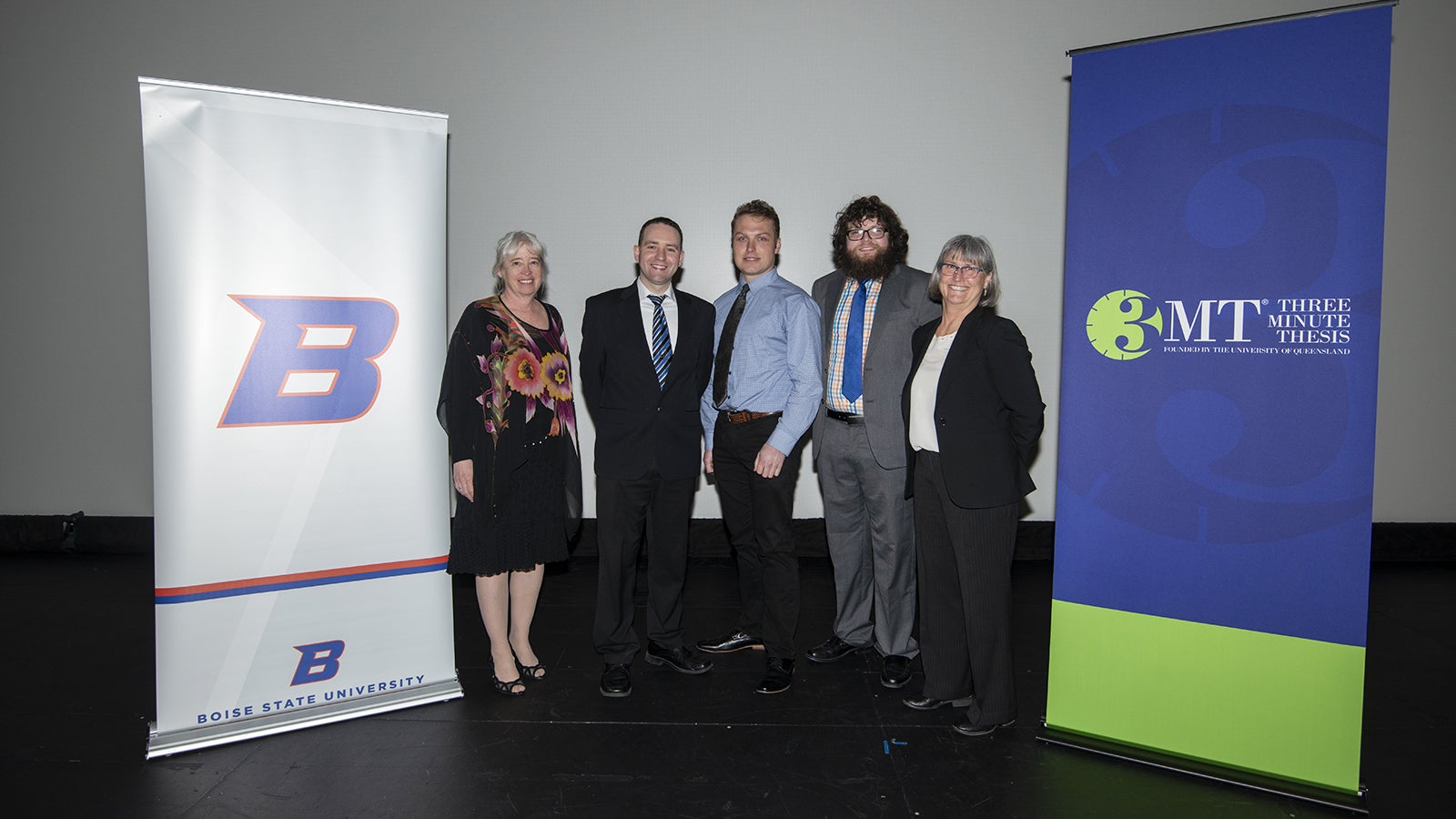Five Boise State University graduate students rose to the challenge of condensing their research theses into three-minute presentations at Idaho’s very first statewide three minute thesis/master competition (3MT/3MM). Originally developed by the University of Queensland in 2008, 3MT is now held at more than 600 universities and challenges graduate students to present their research in a maximum of three minutes with only one slide to display research content.
The Idaho event was held at the Egyptian Theatre on Tuesday, Feb. 12, and featured presentations by students from Boise State, University of Idaho and Idaho State University.
Boise State Interim Provost Tony Roark applauded the presenters on handling the difficult feat with dexterity and spoke of the inspiring level of commitment shown by the students and their mentors that make the state of Idaho proud.
“The commitment that you [presenters] displayed up on the stage I think reflects the commitment of your faculty mentors who are deeply invested in your success and the work that you are doing,” said Roark. “The entire state is behind you, and you have made the state very proud. It is great for me as an Idaho native to see the level of talent that we have working at our state colleges and universities and it makes me feel much better about the future.”
Boise State student presenters:
-
- Mike Henry of the Micron School of Material Science and Engineering presented a thesis titled “Leveraging Self-Assembly to Save the Planet.” The research spoke to the potential of harnessing power from self-assembling plastic solar cells. Henry received mentorship from Eric Jankowski, an assistant professor in the Micron School of Material Science and Engineering.
- Kathy Hurley of the Department of Public Policy and Administration presented a thesis titled “In the Shadows: How the social construction of family need affects child care and family tax policies in the American states.” The research examined the factors determining state adoption of the Dependent and Child Care Tax Credit (DCCTC) policy. Hurley received mentorship from Department of Public Policy and Administration Professor Elizabeth Fredericksen.
- Krista Lyons of the Department of Public Policy and Administration presented a thesis titled “Successful Rulemaking to List Species Under the Endangered Species Act (ESA).” The research elaborated on the factors influencing successful rule making to list a species under the ESA. Lyons received mentorship from Department of Public Policy and Administration Assistant Professor Monica Hubbard.
- Karl Mertens of the College of Arts and Sciences’ Ecology, Evolution and Behavior program presented a thesis titled “Human Economies in a Natural System: Foraging and Regeneration in Kakamega Forest.” The research spoke of creating models of behavior ecology based on the relationship between the Luhya-speaking people of western Kenya and the natural environment they impact. Mertens received mentorship from Professor and Chair of the Department of Anthropology John Ziker.
- Christopher Schuck of the Micron School of Material Science and Engineering presented a thesis titled “Changing the World, One Atom at a Time (It’s a Quantum Revolution!).” The research discussed the creation of semiconductor materials to change the world of quantum technology. Schuck received mentorship from Department of Physics Assistant Professor Paul Simmonds.

The competition culminated in the presentation of awards for first, second and third place, as well as a People’s Choice award. The first place prize of $500 was awarded to University of Idaho student Ezekial Adekanmbi; the second place prize of $300 was awarded to University of Idaho student Allison Stevens; the third place prize of $200 was awarded to Idaho State University Jessica Whitaker-Fornek; and the People’s Choice award was won by Idaho State University student Staci Phelan.
“Education changes lives. At the graduate level, it opens doors and allows our students to pursue their passions, develop the skills they will need to be tomorrow’s leaders, and provides the content knowledge and critical thinking skills needed to contribute to society. We know that those with graduate education report higher health outcomes and increased life satisfaction. They are able to pursue their passions, have a sense of accomplishment and pride and truly know they can make a difference,” said Tammi Vacha-Haase, dean of the Boise State University Graduate College.